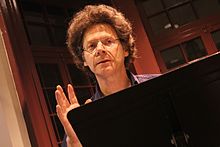Peter Cole
| Peter Cole | |
|---|---|

Peter Cole speaks at Kelly Writers House in 2015.
|
|
| Born | 1957 Paterson, New Jersey |
| Nationality | American |
| Alma mater |
Williams College; Hampshire College |
| Genres | Poetry; Translation |
| Spouse | Adina Hoffman |
Peter Cole is a MacArthur-winning poet and translator who lives in Jerusalem and New Haven. Cole was born in 1957 in Paterson, New Jersey. He attended Williams College and Hampshire College, and moved to Jerusalem in 1981. He has been called "one of the handful of authentic poets of his own American generation" by the critic Harold Bloom. In a 2015 interview in The Paris Review, he described his work as poet and translator as "at heart, the same activity carried out at different points along a spectrum."
In addition to its focus on what he calls "deep translation," Cole’s work as both a poet and a translator reflects a sustained engagement with the cultures of Judaism and especially of the Middle East. He is, Eliot Weinberger has written, “an urban poet whose city is Jerusalem; a classicist whose Antiquity is medieval Hebrew; a sensualist whose objects of delight are Mediterranean; an avant-gardist whose forms are the meditation, the song, the jeremiad, the proverb.” The American Poet noted that “prosodic mastery fuses with a keen moral intelligence” in Cole’s work, which the reviewer says is distinctive for its unfashionable engagement with wisdom and beauty. Writing in Bomb magazine, poet and novelist Ben Lerner observed that Cole's poetry is "remarkable for its combination of intellectual rigor with delight in surface, for how its prosody returns each abstraction to the body, linking thought and breath, metaphysics and musicality. Religious, erotic, elegaic, pissed off--the affective range is wide and the forms restless."
Cole's first book of poems, Rift, was published in 1989 by Station Hill Press. His subsequent volumes of poetry include What is Doubled: Poems 1981-1998 (Shearsman, UK), Things on Which I've Stumbled (New Directions, 2008), and The Invention of Influence (New Directions, 2014), which was a finalist for the Poetry Society of America's William Carlos Williams Award. That book included an extended dramatic poem about the maverick Vienna psychoanalyst Victor Tausk and his notion of "the influence machine." In a 2013 interview with Bookslut, Cole talked about the poem as "a case history of susceptibility" and about the influence machine as a figure for literary tradition: "We're always being manipulated by forces outside us -- familial, fraternal, sexual, social, and literary presences that have brought us to a given moment or scene of 'translation,' or expression. And then we're taken over, as it were, or even possessed by the various presences that enter our lives, for better and worse -- consciously and unconsciously. We're inhabited. These presences live on in us and in some cases become ingrained in us, as habit. And these habits in turn draw other presences to and through us. As poets, as makers, even as readers, whenever we're in the space of the poem, we're constantly in the process of being made and being had -- in all senses of the term, positive and negative. There's something marvelous and exhilarating about this, but also terrifying. One's made greater, clearly, but also runs the risk of ceasing to be one self, which is to say, oneself."
...
Wikipedia
